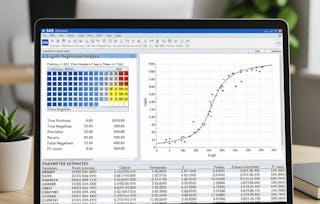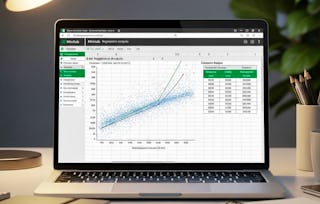This beginner-friendly course provides a comprehensive introduction to logistic regression, one of the most widely used techniques in data science and analytics. Learners will explain regression fundamentals, differentiate probability prediction methods, and analyze logistic regression key concepts including logit transformation, odds interpretation, and Maximum Likelihood Estimation (MLE).
即将结束: 只需 199 美元(原价 399 美元)即可通过 Coursera Plus 学习新技能。立即节省
您将学到什么
Explain logistic regression fundamentals, logit transformation, and odds interpretation.
Apply SAS PROC LOGISTIC for variable selection and predictive modeling.
Evaluate model performance using chi-square tests, concordance, and fit measures.
您将获得的技能
要了解的详细信息

添加到您的领英档案
August 2025
6 项作业
了解顶级公司的员工如何掌握热门技能

该课程共有2个模块
This module introduces learners to the fundamentals of regression and lays the groundwork for understanding logistic regression. Beginning with an overview of regression analysis, the module explores how dependent and independent variables interact, the role of coefficients, and the importance of error terms in modeling. Learners will examine practical applications of regression in real-world problem-solving and policymaking. The module then transitions into different probability prediction methods, highlighting when and why logistic regression is more appropriate than ordinary least squares (OLS). By the end, learners will have a solid conceptual foundation for applying logistic regression to binary outcomes in analytics and decision-making contexts.
涵盖的内容
8个视频3个作业
This module deepens the learner’s understanding of logistic regression by focusing on key modeling concepts, practical approaches, and industry-standard methodologies. Learners will explore foundational ideas such as observation periods, validation samples, and outlier treatment before moving into logistic regression’s core principles, including the logit transformation, odds-to-probability conversion, and the importance of Maximum Likelihood Estimation (MLE). The module introduces practical approaches such as the Binning, Continuous, and Dummy Variable methods to improve model stability. Learners will then engage with SAS-based methodologies for variable selection, PROC LOGISTIC procedures, and evaluation techniques such as concordant/discordant pairs and global vs local measures of model fit. By the end of this module, learners will have the applied knowledge to build, evaluate, and refine logistic regression models in real-world data science and analytics contexts.
涵盖的内容
7个视频3个作业
从 Data Analysis 浏览更多内容
人们为什么选择 Coursera 来帮助自己实现职业发展




常见问题
To access the course materials, assignments and to earn a Certificate, you will need to purchase the Certificate experience when you enroll in a course. You can try a Free Trial instead, or apply for Financial Aid. The course may offer 'Full Course, No Certificate' instead. This option lets you see all course materials, submit required assessments, and get a final grade. This also means that you will not be able to purchase a Certificate experience.
When you purchase a Certificate you get access to all course materials, including graded assignments. Upon completing the course, your electronic Certificate will be added to your Accomplishments page - from there, you can print your Certificate or add it to your LinkedIn profile.
Yes. In select learning programs, you can apply for financial aid or a scholarship if you can’t afford the enrollment fee. If fin aid or scholarship is available for your learning program selection, you’ll find a link to apply on the description page.
更多问题
提供助学金,









